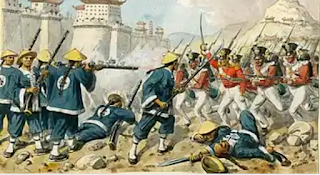First Opium War
The FirstOpium War (China; pinyin: Dìyīcì Yāpiàn Zhànzhēng), also known as the Opium War or the Anglo-Sino War was a series of military engagements fought between Britain and the Qing dynasty of China between 1839 and 1842. The real issue was the Chinese enforcement of their ban on the opium trade by seizing private opium stocks from merchants at Canton and threatening to impose the death penalty for future offenders. Despite the opium ban, the British government supported the merchants' demand for compensation for seized goods, and insisted on the principles of free trade and equal diplomatic recognition with China.
Opium was Britain's single most profitable commodity trade of the 19th century. After months of tensions between the two nations, the British navy launched an expedition in June 1840, which ultimately defeated the Chinese using technologically superior ships and weapons by August 1842. The British then imposed the Treaty of Nanking, which forced China to increase foreign trade, give compensation, and cede Hong Kong to the British. Consequently the opium trade continued in China. Twentieth century nationalists consider 1839 the start of a century of humiliation, and many historians consider it the beginning of modern Chinese history.
In the 18th century, the demand for Chinese luxury goods (particularly silk, porcelain, and tea) created a trade imbalance between China and Britain. European silver flowed into China through the Canton System, which confined incoming foreign trade to the southern port city of Canton. To counter this imbalance, the British East India Company began to grow opium in Bengal and allowed private British merchants to sell opium to Chinese smugglers for illegal sale in China. The influx of narcotics reversed the Chinese trade surplus, drained the economy of silver, and increased the numbers of opium addicts inside the country, outcomes that seriously worried Chinese officials.
In 1839, the Daoguang Emperor, rejecting proposals to legalise and tax opium, appointed Viceroy Lin Zexu to go to Canton to halt the opium trade completely.
Lin wrote an open letter to Queen Victoria, which she never saw, appealing to her moral responsibility to stop the opium trade.
Lin then resorted to using force in the western merchants enclave. He arrived in Guangzhou at the end of January and organized a coastal defense. In March, British opium dealers were forced to hand over 2.37 million pounds of opium. On 3 June, Lin ordered the opium to be destroyed in public on Humen Beach to show the Government's determination to ban smoking.
All other supplies were confiscated and a blockade of foreign ships on the Pearl River was ordered.
Tensions escalated in July after British sailors killed a Chinese villager and the British government refused to hand the accused men over to Chinese authorities. Fighting later broke out, with the British navy destroying the Chinese naval blockade, and launching an offensive. In the ensuing conflict, the Royal Navy used its superior naval and gunnery power to inflict a series of decisive defeats on the Chinese Empire.
In 1842, the Qing dynasty was forced to sign the Treaty of Nanking—the first of what the Chinese later called the unequal treaties—which granted an indemnity and extraterritoriality to British subjects in China, opened five treaty ports to British merchants, and ceded Hong Kong Island to the British Empire. The failure of the treaty to satisfy British goals of improved trade and diplomatic relations led to the Second Opium War (1856–60). The resulting social unrest was the background for the Taiping Rebellion, which further weakened the Qing regime.....
Thanks for reading I hope you enjoyed it...

.jpg)
%20(1).jpg)



Comments
Post a Comment